Table of Contents
Get started with MyPerfectResume today!
- Build a resume on any device
- Pick an ATS-friendly template
- Tailor with AI copy suggestions
Why this resume works
- Quantifies accomplishments: The applicant’s role in improving program efficiency by 25% and reducing client wait time by 30% shows clear achievements and impact.
- Showcases career progression: From youth services advisor to social services counselor, the applicant’s career path reflects steady growth and increasing responsibility within community-focused roles.
- Highlights industry-specific skills: Skills like crisis intervention and therapeutic counseling align with healthcare skills, emphasizing the applicant’s strong fit for roles in social work.
More Social Services Counselor Resume Examples
Our social services counselor resume examples show how to feature your client support, case management, and advocacy skills. Use these social services resume samples to create a resume that emphasizes your dedication to helping others thrive.
Entry-Level Social Services Counselor
Why this resume works
- Centers on academic background: Featuring a Master’s of Social Work, the applicant’s education section showcases a robust academic foundation essential for early-career success.
- Puts skills at the forefront: By positioning skills prominently, this skills-based resume format ensures that key capabilities like client counseling and crisis intervention capture immediate attention.
- Shows digital literacy: The applicant’s experience in developing a resource database highlights their digital readiness, aligning with essential computer skills needed in modern workplaces.
Mid-Level Social Services Counselor
Why this resume works
- Includes a mix of soft and hard skills: Combining technical prowess in case management with interpersonal skills, the applicant effectively balances client relationship building and risk assessment in social services.
- Points to measurable outcomes: Raising program engagement by 30% showcases the applicant’s impact through clear, measurable improvements across various roles.
- Demonstrates language abilities: The applicant’s language skills in Spanish, French, and German facilitate cross-cultural communication, enriching their ability to connect with diverse communities.
Experienced Social Services Counselor
Why this resume works
- Lists relevant certifications: Listing certifications like Certified Clinical Mental Health Counselor and Certified Addiction Counselor on the resume supports expertise and a commitment to learning.
- Focuses on work history: By organizing work experience from recent to past roles in a chronological resume, the applicant effectively showcases extensive experience in social services.
- Emphasizes leadership skills: Developing outreach programs increasing client intake by 30% illustrates leadership skills through innovative strategies in mental health advocacy.
Social Services Counselor Resume Template (Text Version)
David Liu
Chicago, IL 60607
(555)555-5555
David.Liu@example.com
Professional Summary
Empathetic Social Services Counselor with proven ability in enhancing client relationships, optimizing program delivery, and mentoring youth to thrive. Expertise in crisis intervention and community outreach initiatives.
Work History
Social Services Counselor
Unity Community Resources – Chicago, IL
April 2023 – August 2025
- Provided guidance to 50+ clients weekly
- Improved program efficiency by 25%
- Conducted workshops on emotional resilience
Family Support Specialist
Heartland Family Services – Chicago, IL
January 2021 – March 2023
- Reduced client wait time by 30%
- Facilitated family therapy sessions
- Developed 10+ community programs
Youth Services Advisor
Bright Futures Center – Springfield, IL
January 2020 – December 2020
- Increased youth participation by 40%
- Organized career workshops for teens
- Mentored 20+ at-risk youth monthly
Skills
- Client Relationship Management
- Crisis Intervention
- Program Development
- Behavioral Analysis
- Workshops Facilitation
- Community Outreach
- Therapeutic Counseling
- Youth Mentoring
Education
Master of Social Work Social Work
University of Illinois Urbana, IL
December 2019
Bachelor of Arts Psychology
University of Nebraska Lincoln, NE
May 2018
Certifications
- Certified Social Work Supervisor – National Association of Social Workers
- Crisis Intervention Specialist – Crisis Prevention Institute
Languages
- Spanish – Beginner (A1)
- French – Beginner (A1)
- German – Beginner (A1)
Related Resume Guides
Advice for Writing Your Social Services Counselor Resume
Discover our advice on how to write a resume for a social services counselor role and learn how to highlight your dedication to supporting individuals and communities.
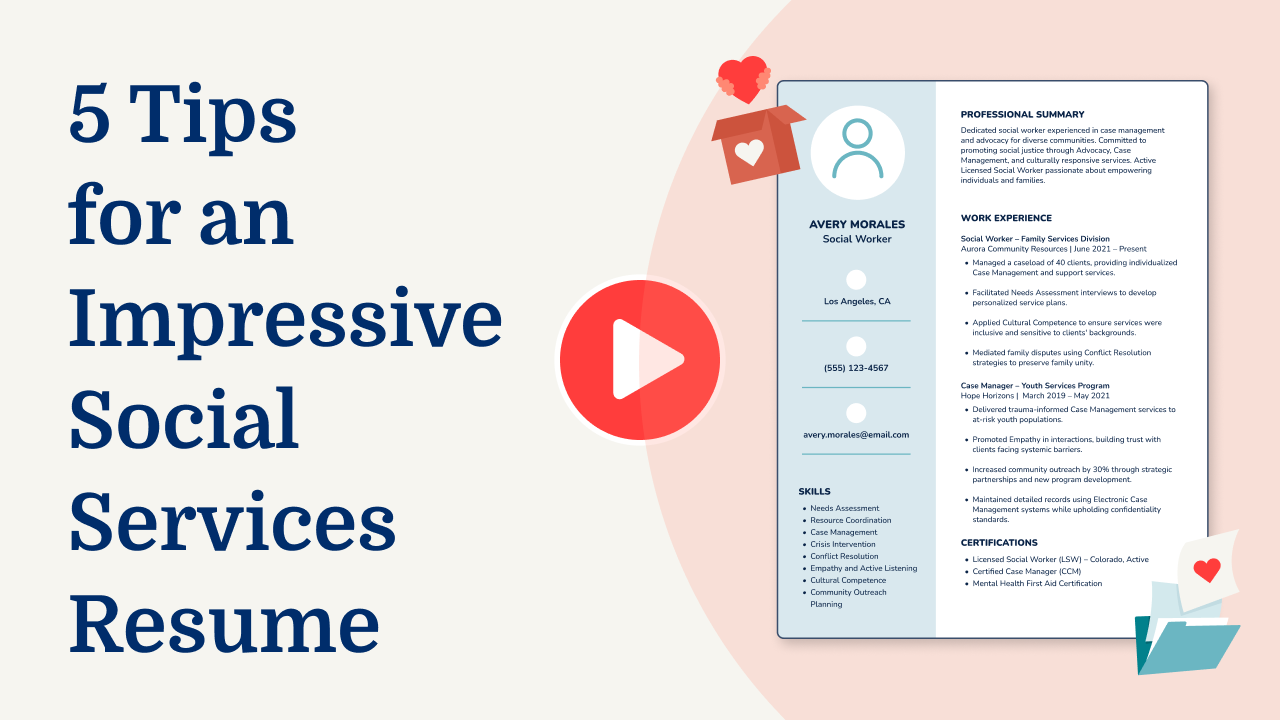
Write a strong professional summary
A professional summary on a resume serves as your introduction to hiring managers, allowing you to either summarize your career achievements or state your career goals.
Typically composed of three to four sentences, a professional summary highlights your experience, skills, and accomplishments. This format is best suited for experienced applicants who want to quickly convey their professional identity and value. Essentially, it showcases “what I’ve accomplished.”
Conversely, resume objectives are statements focused on career goals. They are ideal for entry-level applicants, those changing careers, or individuals with employment gaps. These statements emphasize “what I aim to contribute.”
Next, we’ll offer examples of both summaries and objectives that are tailored for various industries and levels of experience.
Social services counselor resume summary examples
Entry-level
Recent social work graduate with a Bachelor of Social Work from an accredited university, equipped with foundational skills in crisis intervention and case management. Completed internships in community outreach programs focusing on family services and mental health support. Certified in Mental Health First Aid and eager to contribute to a team dedicated to empowering individuals through compassionate counseling.
Mid-career
Seasoned social services counselor with over seven years of experience working in diverse environments including schools and community centers. Expertise in developing tailored care plans, conducting individual and group therapy sessions, and liaising with local agencies for resource allocation. Recognized for successful interventions that improved client outcomes and awarded for outstanding dedication to child welfare initiatives.
Experienced
Veteran social services counselor specializing in trauma-informed care and substance abuse counseling, with over 15 years of experience guiding clients through complex recovery paths. Proven leadership skills in managing multidisciplinary teams and implementing comprehensive service programs that have significantly increased client success rates. Committed advocate for policy development aimed at improving community mental health resources.
Social services counselor resume objective examples
Recent graduate
Compassionate and driven recent social work program graduate seeking an entry-level social services counselor position to apply academic knowledge and interpersonal skills in supporting individuals and families. Eager to contribute to community well-being through effective counseling and resource coordination.
Career changer
Dedicated professional transitioning into social services counseling, with a background in education and strong communication skills developed through teaching experience. Seeking to leverage empathy and problem-solving abilities to make a positive impact in the lives of clients within a supportive agency setting.
Specialized training
Graduate with specialized training in crisis intervention and mental health support seeking a role as a social services counselor. Passionate about employing learned techniques to assist individuals facing challenging situations, aiming to foster resilience and promote overall wellness in diverse communities.
Use our Resume Builder to make your social services counselor resume. It helps you highlight your skills and experience with easy-to-use templates.
Include relevant certifications and training
For a social services counselor, listing certifications and training is important. They show that you have the skills needed for helping others effectively. These credentials can help set you apart from other applicants by showing your commitment to learning more about your field. Having the right certifications and training can also make employers more confident in hiring you.
- Certified Social Worker (CSW)
- Licensed Professional Counselor (LPC)
- Certified Addiction Specialist (CAS)
- Trauma-Informed Care Certification
- Mental Health First Aid Training
These certifications are valuable in proving you have the knowledge for counseling roles. They show your dedication to continued education and skill-building. Highlighting them on your resume makes it easier for employers to see you’re prepared for the job.
Example of a certifications section
Licensed Social Worker (LSW)
Issued by: National Association of Social Workers (NASW)
Issued 2020
Certified Substance Abuse Counselor
Issued by: National Certification Commission for Addiction Professionals (NCCAP)
Expires 2025
Mental Health First Aid Certification
Issued by: National Council for Mental Wellbeing
Issued 2021
Certified Case Manager (CCM)
Issued by: Commission for Case Manager Certification (CCMC)
Expires 2026
Trauma-Informed Care Certification
Issued by: Trauma-Informed Care Consortium
Issued 2022
Pick a resume template with a straightforward layout, professional fonts, and bold colors to ensure your qualifications shine.
Showcase your work experience
When writing a resume for a social services counselor position, it’s important to showcase your work experience in a way that clearly demonstrates your qualifications. This allows employers to understand how your past roles align with the job requirements.
Start by listing your most recent role first and work backward chronologically. Include details like your job title, employer’s name, location, and dates of employment. Using action verbs such as “developed,” “coordinated,” or “assisted” helps highlight your responsibilities and achievements effectively.
To stand out, incorporate measurable results wherever possible. For instance, instead of saying “helped clients,” you could write “counseled 20 clients weekly to improve their life skills.” This approach gives prospective employers a clearer picture of the value you bring to the table.
Focus on key tasks relevant to social services counseling—such as case management, crisis intervention, and client assessments—that demonstrate your expertise in the field.
Additionally, draw attention to any special projects or initiatives you spearheaded or contributed to that led to positive outcomes. By presenting your work experience in an organized and easy-to-read format using concise language, you help hiring managers quickly see why you’re an excellent fit for their team.
Highlighting relevant experiences alongside quantifiable achievements positions you as a skilled social services counselor ready to make an impact.
5 social services counselor work history bullet points
- Developed individualized treatment plans for 50+ clients, resulting in a 25% improvement in client outcomes.
- Facilitated weekly support groups, increasing participant engagement by 40% over six months.
- Collaborated with multidisciplinary teams to coordinate care for at-risk youth, reducing incident reports by 15%.
- Conducted comprehensive assessments and provided crisis intervention services, achieving a 90% satisfaction rate among clients.
- Implemented community outreach programs that increased service utilization by 20%, improving access to critical resources.
For social services counselors, choose a resume format that highlights your counseling experience, relevant certifications, and ability to connect with diverse populations.
Match your resume with the job description
Tailoring resumes to job descriptions is essential for standing out in competitive job markets, especially for roles like social services counselor. By using strategies to customize your resume, you can ensure it catches the attention of employers and passes through ATS. These systems scan for specific keywords and phrases from job postings to filter suitable applicants.
An ATS-friendly resume incorporates relevant keywords and aligns those terms with your skills and experience. Including language directly from the job description increases the chances hiring managers will notice your application. When tailored correctly, such resumes demonstrate a clear connection between your qualifications and the employer’s needs.
To identify keywords, carefully read the job posting for repeated skills, qualifications, or responsibilities. For example, a posting for social services counselor might emphasize terms like “client advocacy,” “treatment planning,” or “case management.” Using exact phrases ensures compatibility with ATS software while reflecting key requirements of the role.
Incorporate these terms naturally by weaving them into your experience section or summary. For instance, rather than writing “Helped clients create care plans,” adjust it to say “Developed personalized treatment plans to address client needs.” This approach aligns your background with specific duties outlined in the job listing.
Targeted resumes improve ATS compatibility while showcasing your ability to meet employer expectations. By using this strategy, you improve your chances of advancing in the hiring process.
Check your resume for over 30 common mistakes in structure and content using our ATS Resume Checker. Instantly see how to boost your resume score with easy-to-follow suggestions.
FAQ
Do I need to include a cover letter with my social services counselor resume?
Yes, including a well-written cover letter with your social services counselor resume can improve your application and boost interview opportunities.
A cover letter provides a chance to express your passion for the role and highlight specific experiences that align with the agency’s mission and values.
For example, if the organization focuses on mental health advocacy or substance abuse programs, you can detail your relevant experience in those areas.
Consider using a Cover Letter Generator to craft a personalized cover letter with step-by-step guidance tailored to the job description and requirements.
Additionally, reviewing cover letter examples can offer insights into effectively conveying your skills and experiences in a way that’s compelling to potential employers.
How long should a social services counselor’s resume be?
For a social services counselor, a one-page resume is often enough if you’re early in your career or transitioning into the field. Focus on highlighting core skills like counseling techniques, case management expertise, and any experience with diverse populations.
If you have extensive experience or specialized certifications, a two-page resume can help provide more detail about significant accomplishments in community outreach, program development, or advocacy work. Just ensure every section adds value to your candidacy.
Explore guidelines on how long a resume should be to make sure yours effectively reflects your qualifications without overwhelming the reader.
How do you write a social services counselor resume with no experience?
When crafting a resume with no experience for a social services counselor role, emphasize your education, skills, and any volunteer work or internships that demonstrate your ability to succeed in the position. Follow these tips:
- Highlight your education: Start by listing your degree in social work or a related field. Include your school’s name, graduation date, and any special coursework that aligns with counseling, such as psychology or sociology.
- Include volunteer experiences: If you’ve volunteered at shelters, hotlines, or community centers, detail these experiences. Focus on the responsibilities you held and the skills you developed like active listening or crisis intervention.
- Showcase key skills: Emphasize soft skills important to counseling roles like empathy, communication, and problem-solving. Any training in conflict resolution or mental health first aid can also be included.
Rate this article
Social Services Counselor
Share this page
Additional Resources
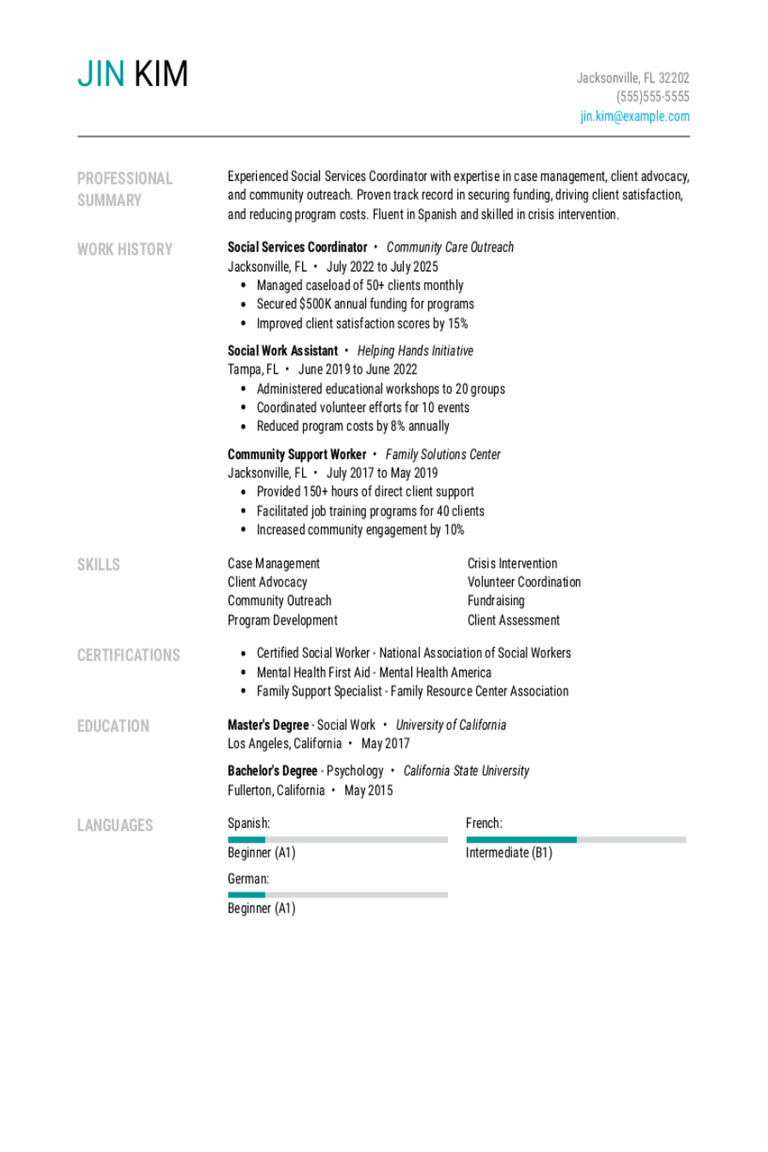
Social Services Resume Examples & Templates
To get considered for jobs in social services, your resume needs to show how you connect with people, support communities, and handle paperwork. Use these samples and tips to learn
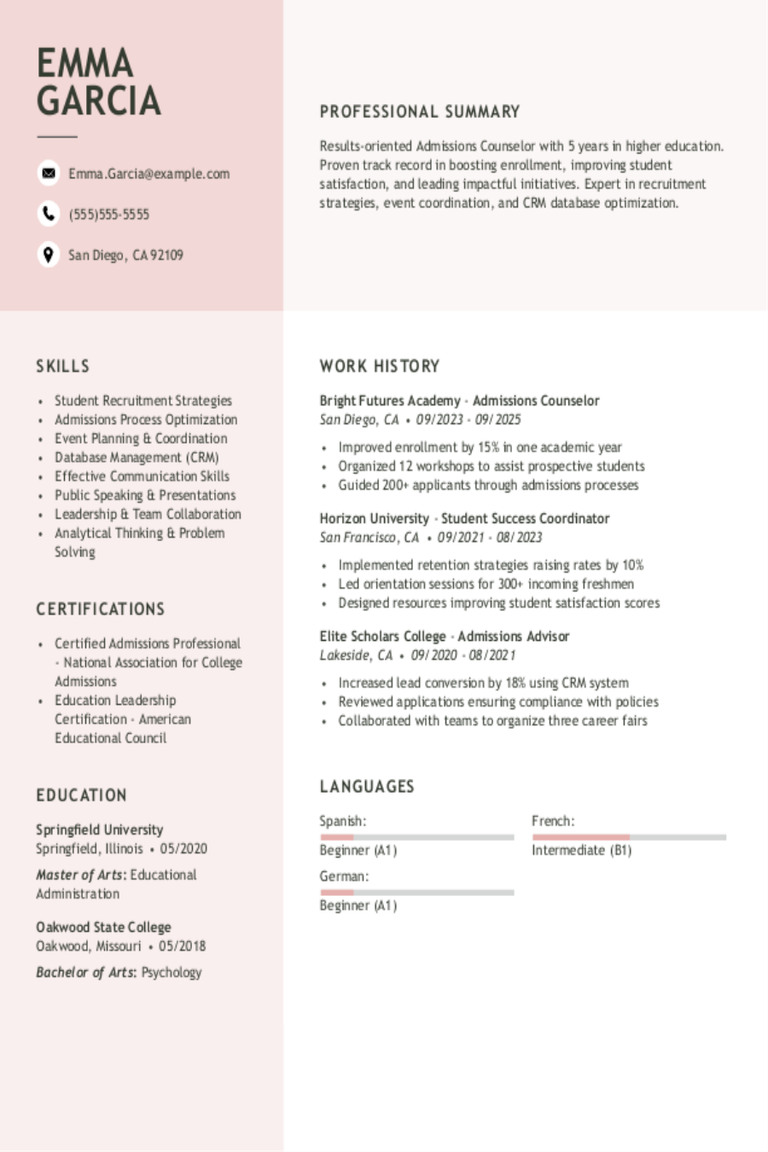
Admissions Counselor Resume Examples & Templates
Explore admissions counselor resume examples and tips to learn how to highlight your knack for guiding students, organizing events, and connecting with families to boost enrollment numbers.Build my resumeImport existing
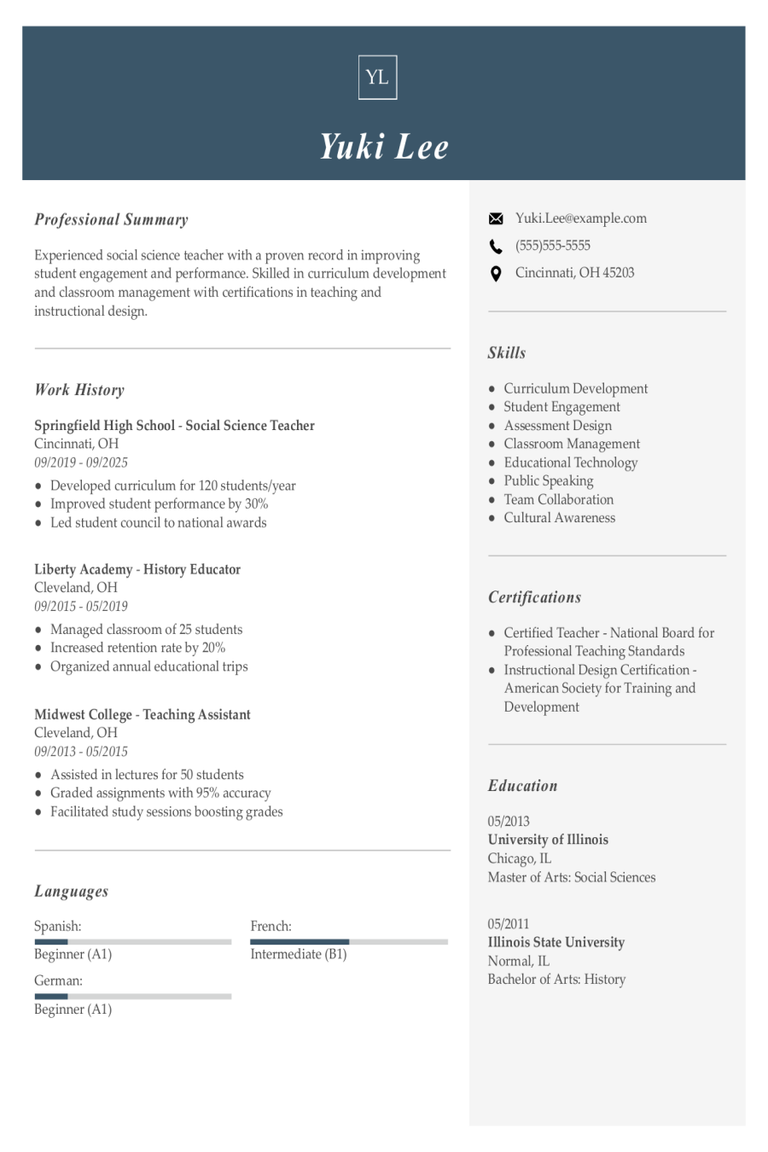
Social Science Teacher Resume Examples & Templates
Discover how social science teachers can showcase their classroom expertise and ability to engage students. These resume examples and tips will help you highlight your lesson planning skills and experience
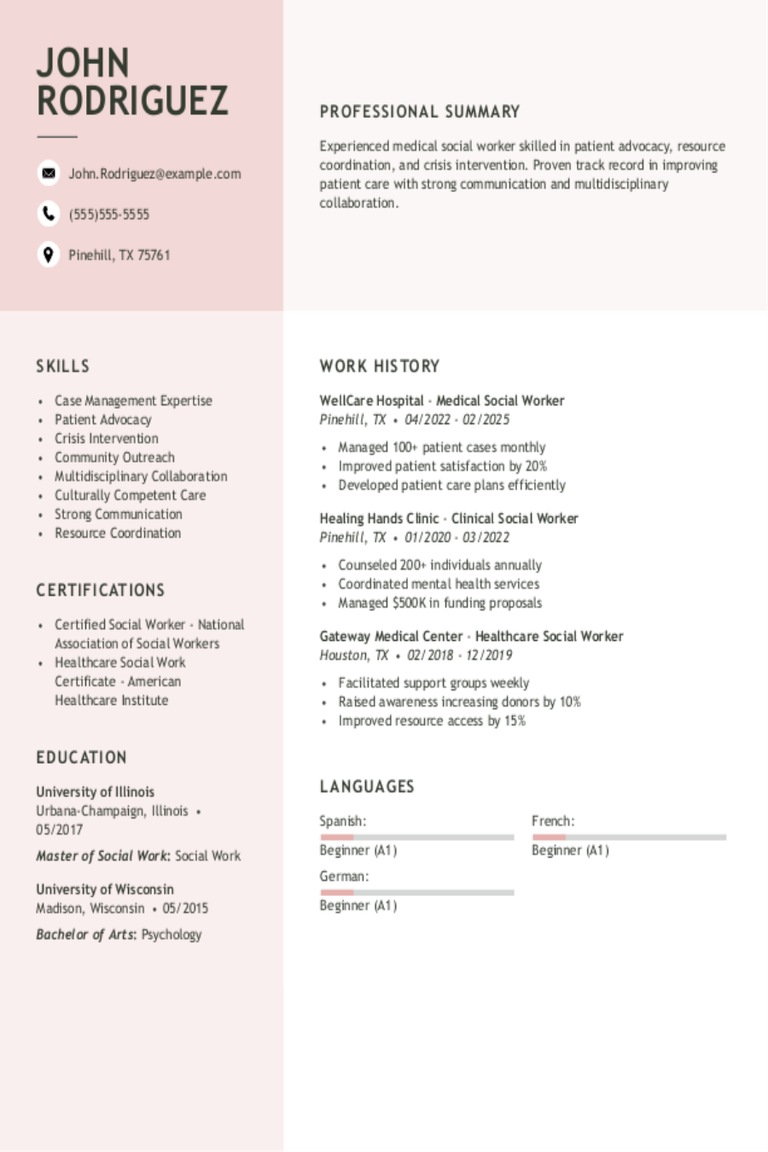
Medical Social Worker Resume Examples & Templates
Explore medical social worker resume examples and discover how to effectively showcase your experience in helping patients navigate complex medical systems and emotional challenges.Build my resumeImport existing resumeCustomize this templateWhy
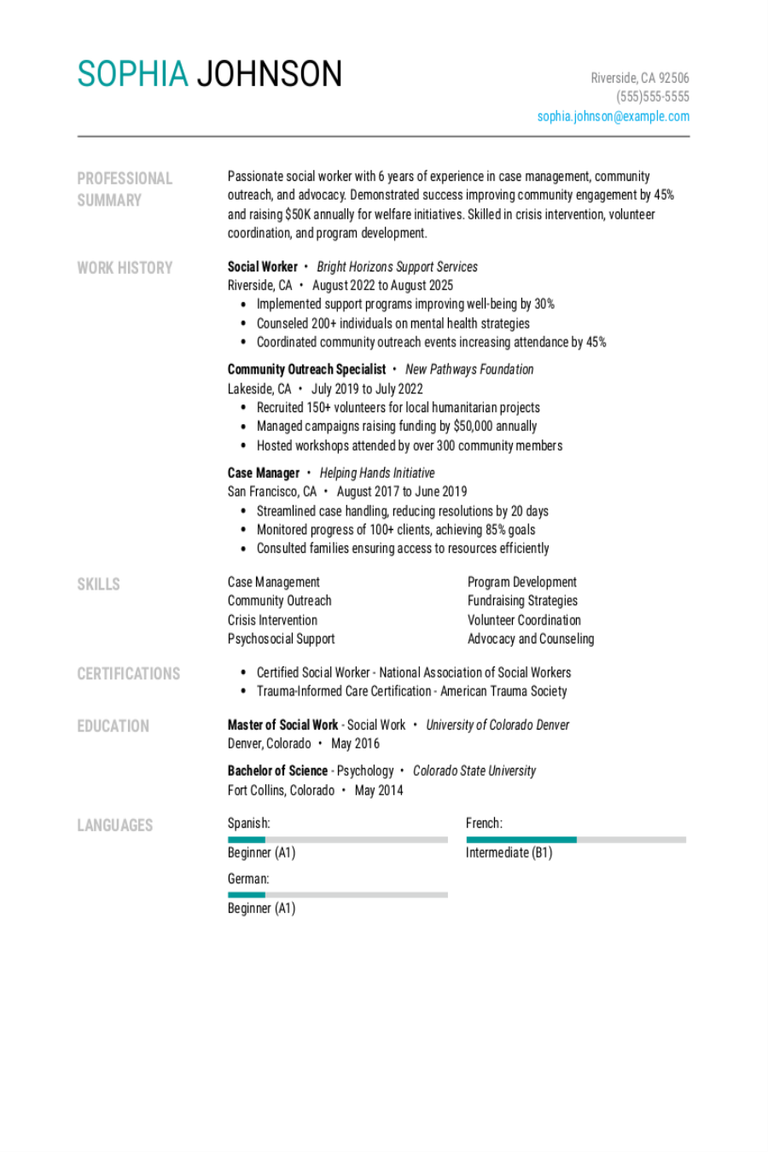
Social Worker Resume Examples & Templates
Explore social worker resume examples and learn how to show hiring teams you’re caring, skilled, and ready to make a difference.Build my resumeImport existing resumeCustomize this templateWhy this resume worksQuantifies
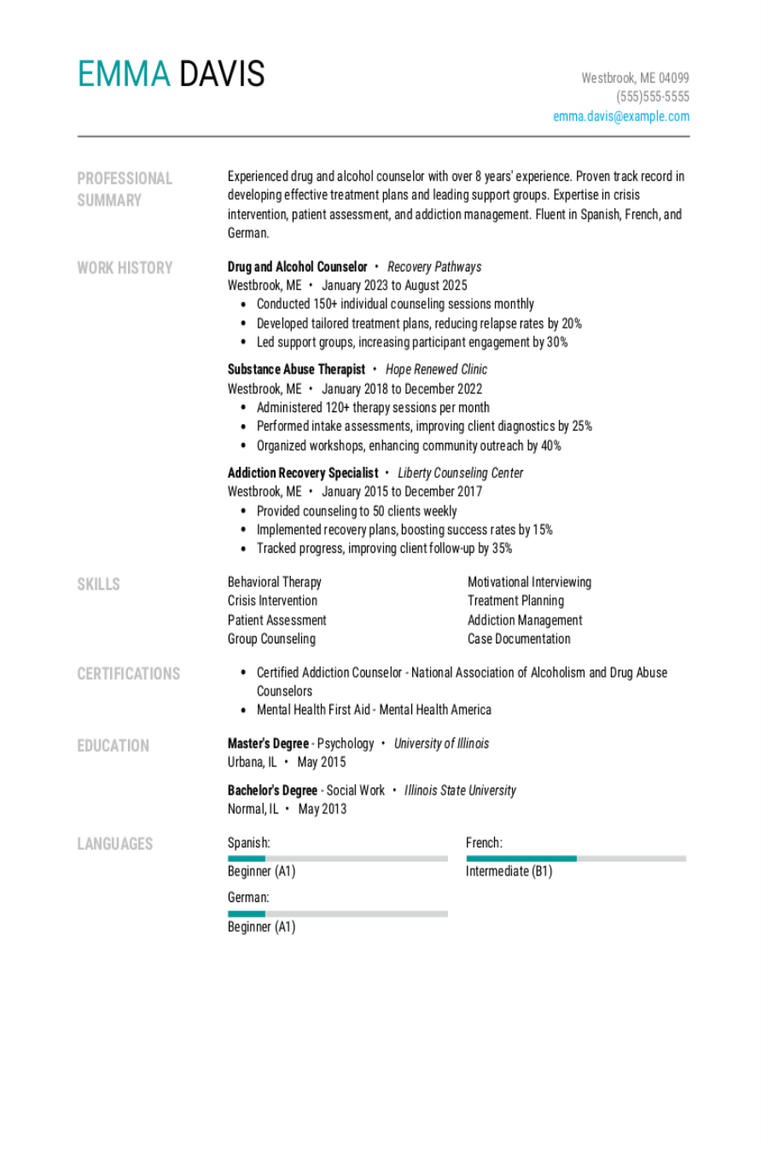
Drug And Alcohol Counselor Resume Examples & Templates
Discover drug and alcohol counselor resume examples and learn how to highlight your ability to support people in overcoming addiction and improving their lives.Build my resumeImport existing resumeCustomize this templateWhy
